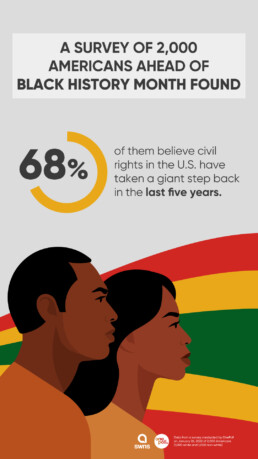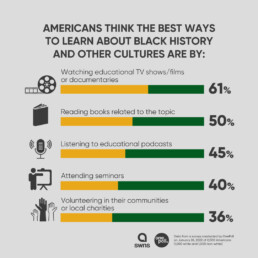Most Americans believe civil rights have taken a giant step back in the last five years, according to our latest poll.
Our OnePoll survey conducted on Jan. 26 of 2,000 adults – 1,000 white and 1,000 non-white Americans – asked respondents how they commemorate Black History Month.
It found two-thirds (68%) think civil rights in America have withdrawn significantly.
For example, after the Senate struck down the Voting Rights bill on Jan.19, 64% of people expressed they were disappointed that the measure was blocked from passing.
Honoring Black History Month
Regardless of politics, people were more focused on honoring Black History Month.
Almost six in 10 respondents (59%) said they celebrate Black excellence throughout February.
Eighty-three percent of American Indian or Alaska Natives reported they also celebrate Black History Month, followed by 78% of Black or African Americans and half of white respondents.
People shared that they observe the month by gathering with their family and friends, watching documentaries about Black history with their children or attending local celebrations in their communities.
One person said they honor former President Barack Obama, poet Maya Angelou and civil rights leader Dr. Martin Luther King Jr. during that time.
Learning about Black history
Sixty-nine percent of all respondents said they wish they had learned more about Black history when they were children. Over eight in 10 American Indian or Alaska Natives (83%), 80% of Black respondents and 66% of white respondents echoed that sentiment.
Similarly, seven in 10 adults (71%) wish they were taught more about other cultures when they were younger.

That may be why 75% think it’s important to learn about Black History Month, and other cultures, in school or the workplace.
In fact, nearly eight in 10 of all respondents believe other ethnicities/cultures that have contributed to society should be included in future school curriculums (77%).
Parents also weighed in on the cultural discussion. Of the 72% of parents surveyed, 87% said they’ve had conversations with their children about the importance of understanding and respecting people’s cultures.
Eight in 10 of them added that they’re grateful their children are learning in school about the Black figures who have shaped American history (81%).
The workplace
When it came to their jobs, 62% of employed Americans said their employers observe Black History Month.
Employers have previously brought in speakers, such as authors or historians, to discuss different topics relating to Black history, according to 75% of respondents.
Although 76% claim their jobs embrace diversity and inclusivity, the same percentage of people believe their employers can do more to increase both.
How to learn more
Overall, the data suggests the best way to learn more about Black history and other cultures is by consuming media, such as educational TV shows, films or documentaries (61%), books (50%) or podcasts (45%).
Other people would rather learn by attending seminars (40%), volunteering in their communities or local charities (36%) or participating in rallies (33%).

This OnePoll online survey was conducted on January 26th 2022, with 2,000 adults – 1,000 white and 1,000 non-white Americans. As members of AAPOR – the American Association for Public Opinion Research, OnePoll researchers adhere to the principles and actions set out in the AAPOR Code.


